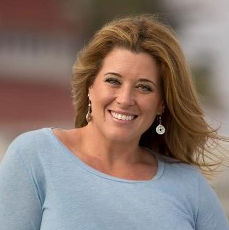Today, SevenPonds speaks with psychologist and professor Christina Zampitella, FT, of Integrative Psychological & Assessment Services (IPAS). Christina is based in San Diego, but travels the US as a professional speaker on the subject of therapy, particularly as a tool for those who are grieving. Her private group practice offers a comprehensive “ variety of [psychotherapy] services for children, adolescents, adults, couple’s and families.”
MaryFrances: What was your inspiration for beginning such a line of work?
Christina: On Christmas day in 1999, my brother, Damien, died from an accidental drug overdose. Three weeks later my grandfather died and two weeks later my sister gave my newborn nephew up for adoption. I was in the middle of my first Master’s degree program in counseling psychology when it all happened.
Once I got into my doctorate program, I had to decide on a dissertation topic. I realized that in the literature, there was only one study that looked at the impact of the loss of an adult sibling between the ages of 18-65. I was surprised at how overlooked we were as grievers, as if the relationship with adult siblings was almost too unimportant to even study it.
“I was surprised at how overlooked we were as grievers, as if the relationship with adult siblings was almost too unimportant to even study it.”
I also have a strong belief in nature-based spirituality and the importance of rituals in the grieving process. Therefore, my dissertation was The Effects of Nature-Based Rituals in the Management of Mourning for Adult Surviving Siblings. In my mind and soul, doing this work is a way of making meaning from Damien’s death; it’s a way to integrate the loss into the narrative of my life. His loss will always be painful, but what I do as a result of this experience helps me help others, which means his death was not in vain.
MaryFrances: How has your personal relationship with death and dying influenced your work?
Christina: I think [practitioners] who [often] work best with [clients who have lost someone] are those who have dealt with their own losses in a healthy manner. With grief, I do feel a therapist who has experienced a loss brings an extra [amount of] depth to the work.
Christina’s 3 Tips for Those Who Are Grieving:
1. Be patient with yourself and those who grieve. Grief is cyclic, confusing, unpredictable and flexible.
2. Learn about disenfranchisement and how to assert yourself if you are disenfranchised. Disenfranchisement is when the griever is denied the right to grieve, the social support to grieve, or is told he/she is grieving incorrectly.
3. Make sure to oscillate between expressing and feeling the pain of the loss and taking care of the restoration aspects of one’s world.
MaryFrances: Do you recall a particular moment or breakthrough in your work that you would like to share?
Christina: There are many! I would say that one that really stands out was a 20-year-old Hispanic man who lost his brother. His hesitancy and resistance to the intervention was high, but he decided to do the ritual anyway.
“In my mind and soul, doing this work is a way of making meaning from Damien’s death; it’s a way to integrate the loss into the narrative of my life.”
When I interviewed him afterwards, the transformation was intense and powerful. I remember thinking about how universal grief is. And I also remember not to underestimate the power of spirituality and empowerment in the grieving process. I watched him touch feelings that, from a cultural perspective, are often disenfranchised and not encouraged — especially [because he was a] male from the Hispanic culture, where expression of pain [is often] discouraged. I felt humbled that he was willing to share his experience with me.
MaryFrances: What are some of the tools you use for healing?
Christina: First off, the grieving process is so individualized that it is important not to create interventions that are “cookie-cutter”; that would disenfranchise the griever.
I use whatever resonates with the griever versus implementing my own agenda. Some generalities include music therapy because it, to me, is the language of the soul. Art is another important modality, which includes everything from writing, drawing, painting, collages, memory books, journaling, writing music, poetry and story writing. It is another outlet that allows a griever to process his or her loss without it always having to be talk therapy; it works on another level of the human psyche.
“I use whatever resonates with the griever versus implementing my own agenda.”
I use meditation to help a griever some calm in the middle of the storm, [to] create a sense of mindfulness to reduce anxiety. It’s important that taking care of one’s body also be part of therapy, so that we focus on a mind/body/spirit approach. Group therapy can be helpful for some grievers, but some do not find it helpful. I also will work with parents to help them understand how children and adolescents express grief differently than adults so they are empowered to support their family without feeling lost in how to help their family.
More SevenPonds Interviews:
- What Are the Tools for Meditating While Dying? An Interview With Maneesha James
- How Do You Get Started with Estate Planning? An Interview with Nancy Williamson
- What is Guided Imagery? An Interview with Leslie Davenport

 What is Integrative Psychological & Assessment Services? An Interview with Christina Zampitella, FT
What is Integrative Psychological & Assessment Services? An Interview with Christina Zampitella, FT




 First the Wealth Gap, Now the U.S. Has a Growing Health Gap
First the Wealth Gap, Now the U.S. Has a Growing Health Gap

 Our Annual Seven Holiday Gifts for Someone Who Is Grieving, 2024 Edition
Our Annual Seven Holiday Gifts for Someone Who Is Grieving, 2024 Edition














